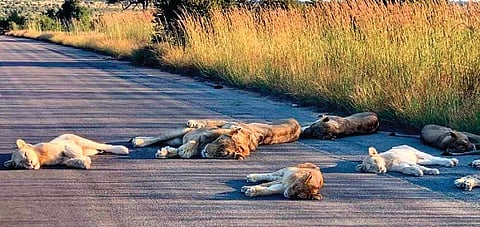

CHENNAI : Animals are in the news during the pandemic. Whether it is a funny video of monkeys in public swimming pools, birds on city streets or serious stories like the virus found in native bat species or the worst news yet — zoo animals being fed to each other in New York’s zoo — there is a lot of news that is surfacing at this time raising serious questions on animal rights and how we as humans are dealing with these voiceless creatures that also call this planet their home.
The link between the virus and animals seems inextricable — it was likely that the virus launched in a ‘wet market’, The Hunan Seafood Wholesale Market in Wuhan. Many of us were unfamiliar with the term wet market before this. Similar to a vegetable market, wet markets in Asian countries are typically several open-air stalls selling fresh seafood, meat, fruits and vegetables. Some wet markets sell and slaughter live animals on site, including chicken, fish and shellfish.
In China, they’re a staple of daily life for many. Some of these wet markets also have wildlife for meat and as exotic pets. Since the outbreak, the support in favour of closure of unregulated wildlife markets across Southeast Asia is widespread. In Hong Kong, Japan, Myanmar, Thailand and Vietnam, there is immense pressure on the government to eliminate illegal and unregulated markets. China never ordered the closure of its wet markets and has recently opened up some of them again.
They did however ban the trade and consumption of wild animals at the end of January this year, a big victory for animal welfare world over. While all of this is happening globally, it could be a useful time for us to really examine our interface with animals and use this opportunity to tighten a few animal welfare laws to prevent future biological disasters.
What is a biological disaster? Widespread diseases in animals, humans or plants caused by another organism on an epidemic (prevalent in a community) or pandemic level (prevalent globally) due to natural or manmade factors are known as biological disasters. The coronavirus- induced pandemic is an eyeopener for countries to collectively address the health and welfare of both people and animals. In India, the fear of spread in disease by animals is primarily through animal farms which are unsustainable and over exploited. In order to reduce this risk, major food companies and smaller farms alike must improve the welfare of animals that they produce, supply or use.
The inhumane factory farming and transportation of animals prior to slaughter rank amongst the most important welfare issues along with the attitude of workers. Biological disasters can be managed by adopting strategies to improve the quality of life for animals that are reared for meat, having stringent disease control methods and education. As an individual, if you are making a choice to consume an animal product, choose one that is responsible to the animal, to the planet and to you. In this regard, completely switching to a plant-based diet is amongst the most prominent topic in food ethics today. In the words of the Mahatma “The greatness of a nation and its moral progress can be judged by the way its animals are treated.” Be kind to our animals, stop biological disasters, go vegan!